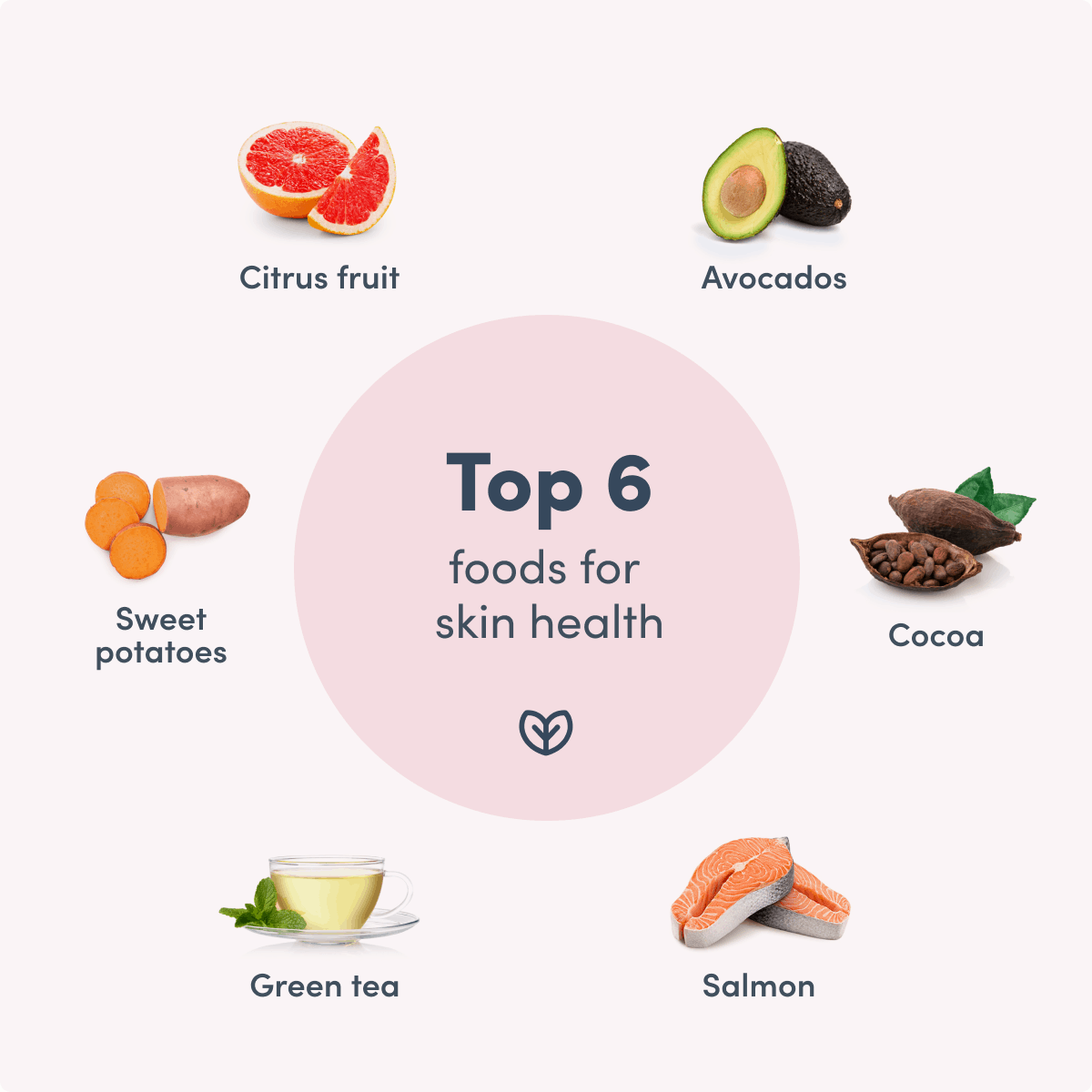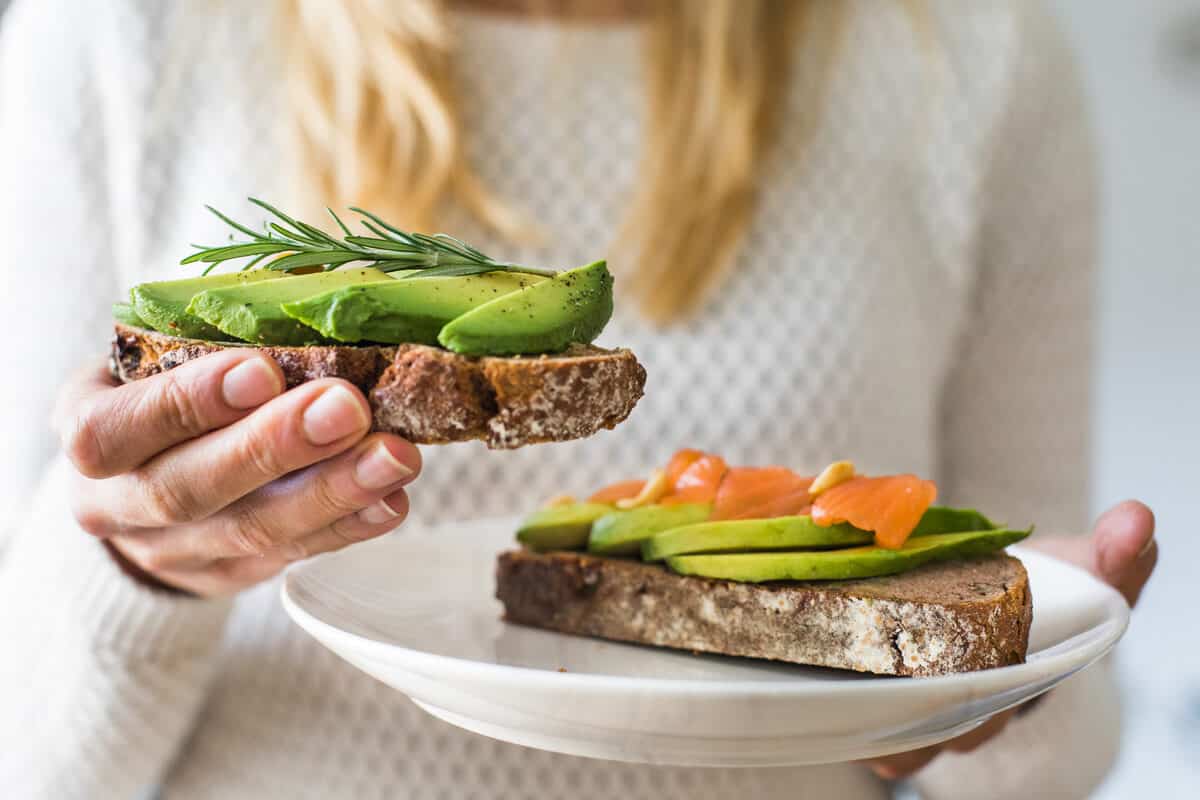Top 6 foods for skin health
So what are the top foods for skin health? Read on to discover how these six evidence-based, nutrient-dense foods support glowing skin from the inside out.
Avocados, citrus fruits, and cocoa are among the top foods for skin health.
Avocados
There is no question about it—healthy fats are essential to skin health. (10)(11) According to in vitro studies, the beneficial fatty acids found in avocados may help to suppress inflammation and protect against ultraviolet B (UVB) cell damage caused from unprotected sun exposure. (15) Spread on crusty sourdough bread or mashed up for fresh guacamole, it’s hard not to love this source of healthy fats. Avocados are also rich in vitamin E, another nutrient essential to maintaining healthy skin. (4) Clinical trials have shown that both topical and oral consumption of vitamin E provides photoprotection during UV exposure, suggesting that consuming food high in vitamin E, such as avocados, can help to mitigate some of the negative effects UV radiation can have on cellular DNA. (4)
The fatty acids found in avocados can help curb inflammation and protect the skin against damage caused by unprotected sun exposure. (15)
Citrus fruit
Citrus fruit, such as lemons, limes, and grapefruits, are well-known for their high vitamin C content, which not only supports immunity but also plays an essential role in skin health. (21) Vitamin C is essential for collagen synthesis, the most abundant protein in the body that reduces signs of aging and keeps the skin supple and soft. (21)
Citrus fruit is loaded with vitamin C that is essential for collagen synthesis, the most abundant protein in the body that keeps the skin supple and soft. (21)
Cocoa
Looking for yet another reason to indulge in dark chocolate? Flavanol-rich cocoa has been shown to have multiple positive effects on skin health. (6)(12)(17)(22) Consuming antioxidant-rich cocoa increases the flow of blood and oxygen to the skin. (12) In a study conducted on women experiencing moderate photoaging, researchers demonstrated that regular cocoa consumption has a positive effect on both elasticity and the appearance of age-related wrinkles. (22) Similar to many of our other favorite skin health foods, the phytochemicals in cocoa can protect the skin against damage from sun exposure. (17) Even adding some cocoa powder to your morning smoothie could go a long way in protecting and nourishing your largest organ.Green tea
Consumed by many cultures worldwide, green tea possesses anti-inflammatory plant compounds such as polyphenols and carotenoids. These compounds, also known as phytochemicals, protect the skin from ultraviolet A (UVA) and UVB radiation from the sun, and may help improve the overall quality of the skin, such as elasticity, moisture, and tone. (5)(8)(13)(16) Several studies have provided evidence that both external and internal applications of green tea may provide protection from sunburns. (8)(16) Epigallocatechin-3-gallate (EGCG), an anti-inflammatory component of green tea, has been shown to protect against skin cancer caused by chemical and UV radiation. (7) One study also found that the polyphenols found in green tea increase microcirculation to the skin, providing skin-supportive oxygen and nutrients. (5)Salmon
A piece of freshly baked wild salmon benefits more than just your tastebuds. The omega-3 fatty acids found in salmon play a major role in skin health. For example, omega-3 fatty acids have been shown to protect the skin against dryness and reduce inflammation that can lead to conditions, such as acne and psoriasis, an autoimmune condition causing red, itchy scaly patches on the skin. (9)(19) The promising anti-inflammatory effects of omega-3 fatty acids have also been shown to be a likely contributor in helping reduce occurence of non-melanoma skin cancer in human clinical studies. (2) Just like avocados, salmon is also a great source of vitamin E, a phytonutrient essential to protecting the skin against harmful UV rays. (4)
Sweet potatoes and other orange-pigmented vegetables are high in a skin-supportive phytonutrient called beta-carotene. (1)(4)
Sweet potatoes
Sweet potatoes are loaded with flavor as well as a skin-supportive beta-carotene, a phytonutrient that is also found in other orange-pigmented vegetables such as carrots. (1)(4) This phytonutrient is essential for reducing inflammation and oxidative stress in the skin, which often occurs due to unprotected sun exposure. (4)(20) As a result, regularly adding a variety of these vegetables to your diet can help protect the skin against premature aging caused by prolonged sun exposure. (18) Beta-carotene is also the precursor to vitamin A, another important vitamin for skin health. (14) Found in the sebaceous glands (oil-producing glands), vitamin A appears to play an important role in regulating sebum (oil) production, a contributing factor to the development of acne. (14)The bottom line
Consuming a diet rich in nutrient-dense foods promotes health in various ways, and the health of our skin is no exception. Plant-based foods such as avocados, citrus fruit, cocoa, and sweet potatoes all contain vitamins for skin health that support and protect cells against damage caused by environmental factors such as UV radiation. Consuming omega-3-rich salmon can help protect against inflammation of the skin, and sipping on green tea has been shown to provide numerous benefits, from protecting the skin from sunburns to improving tone and texture. With every meal we eat, we have the opportunity to nourish and protect our skin from the inside out.- Biesalski, H. K., & Obermueller-Jevic, U. C. (2001). UV light, beta-carotene and human Skin—Beneficial and potentially harmful effects. Archives of Biochemistry and Biophysics, 389(1), 1–6.
- Black, H., & Rhodes, L. (2016). Potential benefits of omega-3 fatty acids in Non-Melanoma skin cancer. Journal of Clinical Medicine, 5(2), 23.
- Burns, T. (2021). Rook’s Textbook of Dermatology (4 Vols.). MLBD.
- Evans, J. A., & Johnson, E. J. (2010). The role of phytonutrients in skin health. Nutrients, 2(8), 903–928.
- Heinrich, U., Moore, C. E., de Spirt, S., Tronnier, H., & Stahl, W. (2011). Green tea polyphenols provide photoprotection, increase microcirculation, and modulate skin properties of women. The Journal of Nutrition, 141(6), 1202–1208.
- Heinrich, U., Neukam, K., Tronnier, H., Sies, H., & Stahl, W. (2006). Long-Term ingestion of high flavanol cocoa provides photoprotection against UV-Induced erythema and improves skin condition in women. The Journal of Nutrition, 136(6), 1565–1569.
- Katiyar, S., & Elmets, C. (2001). Green tea polyphenolic antioxidants and skin photoprotection (review). International Journal of Oncology, 18(6).
- Katiyar, S. K. (2003). Skin photoprotection by green tea: Antioxidant and immunomodulatory effects. Current Drug Targets – Immune, Endocrine & Metabolic Disorders, 3(3), 234–242.
- Krutmann, J. (2011). Nutrition for Healthy Skin. Springer.
- Lorencini, M., Brohem, C. A., Dieamant, G. C., Zanchin, N. I., & Maibach, H. I. (2014). Active ingredients against human epidermal aging. Ageing Research Reviews, 15, 100–115.
- McCusker, M. M., & Grant-Kels, J. M. (2010). Healing fats of the skin: The structural and immunologic roles of the ω-6 and ω-3 fatty acids. Clinics in Dermatology, 28(4), 440–451.
- Neukam, K., Stahl, W., Tronnier, H., Sies, H., & Heinrich, U. (2006). Consumption of flavanol-rich cocoa acutely increases microcirculation in human skin. European Journal of Nutrition, 46(1), 53–56.
- Oyetakin White, P., Tribout, H., & Baron, E. (2012). Protective mechanisms of green tea polyphenols in skin. Oxidative Medicine and Cellular Longevity, 2012, 1–8.
- Pappas, A. (2009). The relationship of diet and acne. Dermato-Endocrinology, 1(5), 262–267.
- Rosenblat, G., Meretski, S., Segal, J., Tarshis, M., Schroeder, A., Zanin-Zhorov, A., Lion, G., Ingber, A., & Hochberg, M. (2010). Polyhydroxylated fatty alcohols derived from avocado suppress inflammatory response and provide non-sunscreen protection against UV-induced damage in skin cells. Archives of Dermatological Research, 303(4), 239–246.
- Saric, S., & Sivamani, R. (2016). Polyphenols and Sunburn. International Journal of Molecular Sciences, 17(9), 1521.
- Scapagnini, G., Davinelli, S., di Renzo, L., de Lorenzo, A., Olarte, H., Micali, G., Cicero, A., & Gonzalez, S. (2014). Cocoa bioactive compounds: Significance and potential for the maintenance of skin health. Nutrients, 6(8), 3202–3213.
- Schagen, S. K., Zampeli, V. A., Makrantonaki, E., & Zouboulis, C. C. (2012). Discovering the link between nutrition and skin aging. Dermato-Endocrinology, 4(3), 298–307.
- Simopoulos, A. P. (2002). Omega-3 fatty acids in inflammation and autoimmune diseases. Journal of the American College of Nutrition, 21(6), 495–505.
- Stahl, W., & Sies, H. (2012). β-carotene and other carotenoids in protection from sunlight. The American Journal of Clinical Nutrition, 96(5), 1179S-1184S.
- Telang, P. (2013). Vitamin C in dermatology. Indian Dermatology Online Journal, 4(2), 143.
- Yoon, H. S., Kim, J. R., Park, G. Y., Kim, J. E., Lee, D. H., Lee, K. W., & Chung, J. H. (2015). Cocoa flavanol supplementation influences skin conditions of Photo-Aged women: A 24-Week Double-Blind, randomized, controlled trial. The Journal of Nutrition, 146(1), 46–50.





